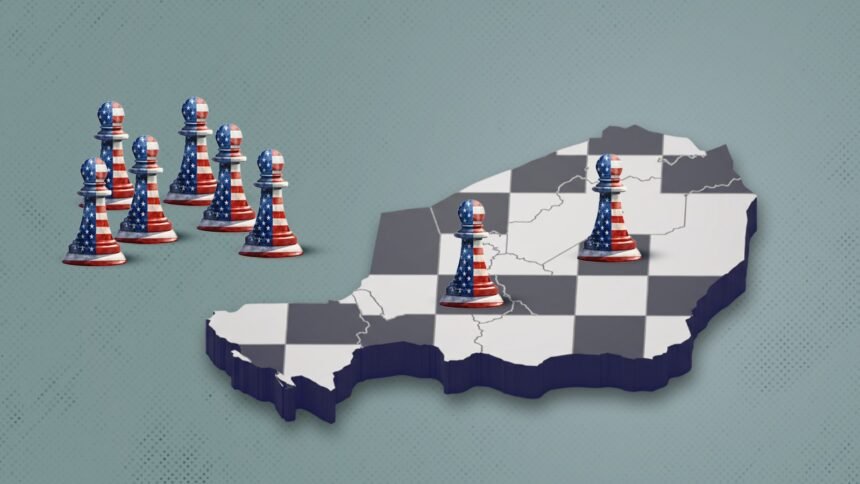In the sweltering sands of Niger, a new chapter in West Africa’s evolving power game is being written—and Washington is getting squeezed out. The military junta now ruling Niger has reportedly demanded that the United States reduce its troop presence by a whopping 75%, a dramatic blow to American influence in a region once seen as a cornerstone of counterterrorism efforts.
The demand, issued behind closed doors but leaked to Western media and later confirmed by U.S. officials, comes just months after the junta forced the closure of a major American drone base and told France to vacate its forces entirely. In short, Niger is rapidly reshaping its foreign alliances, ditching its traditional Western partners in favour of alternatives that offer security without sermons.
For years, Niger was the darling of Western counterterrorism strategy in the Sahel. With U.S. forces running surveillance drones from Agadez, and French troops conducting anti-jihadist operations in coordination with local militaries, the idea was simple: hold the line against Islamic State and al-Qaeda affiliates spreading across the desert. But coups in Mali, Burkina Faso, and finally Niger last year turned that vision on its head.
Now, General Abdourahmane Tchiani’s junta is charting its own path—one that increasingly tilts toward Russia and other non-Western allies. The decision to dramatically scale back the U.S. presence fits neatly into this shift. Officials in Niamey say the demand is about sovereignty and dignity. “We refuse to be a playground for great power rivalry,” one junta spokesman reportedly said.
But the geopolitical subtext is hard to miss. Russia’s growing foothold in Africa, through military trainers, private security outfits like the former Wagner Group, and arms deals, has made it an appealing partner for military regimes craving legitimacy and protection. In fact, Russian advisers have already been spotted in Niamey, and some reports suggest Niger is considering formal defence agreements with Moscow.
So what does all this mean for the United States? In raw numbers, Washington has about 1,000 troops stationed in Niger—one of its largest deployments on the continent. A 75% cut would leave barely 250 personnel on the ground, a skeleton crew with limited ability to conduct operations or maintain vital infrastructure.
The move also undermines one of the Pentagon’s most expensive and controversial investments in Africa: the $110-million Air Base 201 in Agadez, a drone hub designed to monitor jihadist activity across the Sahel and even into Libya. With access now restricted and operations curtailed, the base risks becoming a costly white elephant.
It’s not just about drones and desert runways, though. The American retreat from Niger signals a broader shift: Africa’s new military rulers are growing bolder, confident they can say “no” to Washington without facing the kind of repercussions once feared. After all, Mali and Burkina Faso did the same—and got Russian arms, military advisors, and some measure of security support in return.
For ordinary Nigeriens, the picture is more complicated. The country remains under severe economic strain following ECOWAS sanctions and a diplomatic freeze with Western partners. Inflation is biting, jobs are scarce, and basic services are suffering. Whether the junta’s reorientation will improve or worsen those conditions remains to be seen.
Critics of the junta argue that pushing out Western forces won’t solve Niger’s jihadist problem. The Islamic State in the Greater Sahara and Boko Haram still pose serious threats, particularly in the Tillabéri and Diffa regions. Without intelligence support and drone surveillance, the country could lose valuable tools for tracking and neutralising insurgents.
But junta loyalists counter that Western involvement hasn’t exactly produced miracles. Terror attacks have persisted despite years of international military assistance. To them, new partnerships could offer both autonomy and effectiveness—free from the perceived paternalism of Washington or Paris.
For the Biden administration, the challenge now is how to respond. Cut off aid and risk losing any leverage? Or maintain a symbolic presence and hope for future reconciliation? Either way, the message from Niamey is clear: the days of American dominance in the Sahel are fading fast.
In the wider regional picture, this isn’t just about Niger. It’s about a string of coups, a contest of global powers, and a generation of military leaders seeking to assert themselves in a new world order. The West once called the shots in the Sahel. Now, it’s being shown the door—politely, perhaps, but firmly.
As the American flag slowly lowers over the Agadez base, the symbolism couldn’t be more stark. The sand is shifting in Africa—and Washington will have to dig deep to figure out what comes next.










